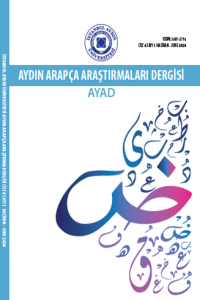Öz
This study scrutinizes the effectiveness and feasibility of a story-based language teaching in Moroccan EFL classrooms. In doing so, a quasi-experimental mixed method was adopted and sample of 80 common core students were randomly selected and put into experimental and control groups. The experimental group was exposed to story-based lessons whose source of input was stories while the control group was exposed to lessons from the ministry EFL textbook. To assess the impact of this approach, a student questionnaire and a classroom observation were also used. The results revealed that the experimental group performed better in proficiency tests than the control group. A statistically significant difference between the experimental and the control group was observed. A positive change in motivation to learn the language was also noticed during classroom observations. The results also showed a positive difference in grammar scores concerning the structure taught via stories. Therefore, the findings in general, proved that the use of story-based language teaching can boost the students’ grammar knowledge along with the students' eagerness to read more stories. Some students even started using some vocabulary items and chunks in their production be it speaking or writing.
Anahtar Kelimeler
Story-Based Language Teaching TEFL Applied Linguistics Motivation and Retention
Kaynakça
- American Council on the Teaching of Foreign Languages (ACTFL). Standards for Foreign Language Learning in the 21st Century. 3rd ed. Alexandria, VA: ACTFL, 2006.
- Bruner, Jerome. Actual Minds, Possible Worlds. Harvard University Press, 1986.
- Bruner, Jerome. Making Stories: Law, Literature, Life. Harvard University Press, 2002.
- Chiang, Meiling. "Multiple Interpretations in Literary Texts." Journal of Language and Literature 29, no. 2 (2007): 120.
- Dubin, F. "Reading in EFL Pedagogy." Journal of Applied Linguistics, 1992, 56.
- Duff, Alan, and Alan Maley. Literature. Oxford University Press, 1990.
- Erkaya, Ozgecan Baskent. "Benefits of Using Short Stories in the EFL Context." Asian EFL Journal 8, no. 1 (2005): 38-39.
- Glazer, Susan Mandel, and Anne W. Burke. An Integrated Approach to Early Literacy: Literature to Language. Allyn and Bacon, 1994.
- Gudmundsdottir, Sigrun. “The Narrative Nature of Pedagogical Content Knowledge.” In Reform in Teacher Education: A Study of School-Based Programs, edited by Sandra Hollingsworth and Hugh Sockett, 205-222. Falmer Press, 1995.
- Jennings, Jean. "The Power of Stories in the ESL Classroom." TESOL Quarterly 25, no. 4 (1991): 681-684.
- Khatib, Mohammad Ali, and Seyyedrezaei Seyyedrezaei. “A Story-Based Language Teaching Method: Promoting the Learners’ Personal, Cultural, and Linguistic Awareness.” Procedia - Social and Behavioral Sciences 70 (2013): 20-25.
Öz
Kaynakça
- American Council on the Teaching of Foreign Languages (ACTFL). Standards for Foreign Language Learning in the 21st Century. 3rd ed. Alexandria, VA: ACTFL, 2006.
- Bruner, Jerome. Actual Minds, Possible Worlds. Harvard University Press, 1986.
- Bruner, Jerome. Making Stories: Law, Literature, Life. Harvard University Press, 2002.
- Chiang, Meiling. "Multiple Interpretations in Literary Texts." Journal of Language and Literature 29, no. 2 (2007): 120.
- Dubin, F. "Reading in EFL Pedagogy." Journal of Applied Linguistics, 1992, 56.
- Duff, Alan, and Alan Maley. Literature. Oxford University Press, 1990.
- Erkaya, Ozgecan Baskent. "Benefits of Using Short Stories in the EFL Context." Asian EFL Journal 8, no. 1 (2005): 38-39.
- Glazer, Susan Mandel, and Anne W. Burke. An Integrated Approach to Early Literacy: Literature to Language. Allyn and Bacon, 1994.
- Gudmundsdottir, Sigrun. “The Narrative Nature of Pedagogical Content Knowledge.” In Reform in Teacher Education: A Study of School-Based Programs, edited by Sandra Hollingsworth and Hugh Sockett, 205-222. Falmer Press, 1995.
- Jennings, Jean. "The Power of Stories in the ESL Classroom." TESOL Quarterly 25, no. 4 (1991): 681-684.
- Khatib, Mohammad Ali, and Seyyedrezaei Seyyedrezaei. “A Story-Based Language Teaching Method: Promoting the Learners’ Personal, Cultural, and Linguistic Awareness.” Procedia - Social and Behavioral Sciences 70 (2013): 20-25.
Ayrıntılar
| Birincil Dil | İngilizce |
|---|---|
| Konular | Arap Dili, Edebiyatı ve Kültürü |
| Bölüm | Araştırma Makaleleri |
| Yazarlar | |
| Yayımlanma Tarihi | 14 Nisan 2025 |
| Gönderilme Tarihi | 26 Haziran 2024 |
| Kabul Tarihi | 17 Temmuz 2024 |
| Yayımlandığı Sayı | Yıl 2024 Cilt: 6 Sayı: 1 |
All site content, except where otherwise noted, is licensed under a Creative Common Attribution Licence. (CC-BY-NC 4.0)



